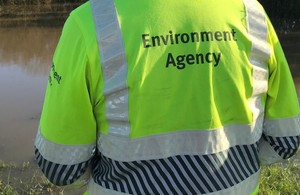Budleigh Salterton needs action to meet new bathing water standards
The bathing water at Budleigh Salterton is at risk of failing tough new standards for water quality the Environment Agency has warned.

The Environment Agency, East Devon District Council, local business leaders and interest groups are meeting later today (June 23) to discuss how to meet the challenge of improving water quality at Budleigh Salterton.
From 2015 much more stringent water quality targets come into force under the revised Bathing Water Directive. The Environment Agency is concentrating on tackling sources of pollution before the targets come into force.
Karen Irwin from the Environment Agency said:
It is only a year before we need to meet tighter bathing water standards and everyone has a part to play. We are working on those beaches which might struggle to meet the new targets.
Pollution can come from a variety of sources including agricultural run-off, sewage overflows and animal and bird faeces on beaches. Households and businesses with badly connected drains, or drains blocked with fats and oils, or nappies can also pollute bathing waters.
Karen added:
The Environment Agency is tracking down specific sources of pollution at Budleigh Salterton. We will continue to work with our partners and the local community to tackle these.
Cllr Tom Wright commented:
The quality of bathing waters around our coast has never been better, but we are having to meet ever improving standards. We know that most of the time the water quality at Budleigh is high, but can be affected by pollution, particularly after heavy rain.
We are all working together to improve bathing water quality and East Devon are seeking the help of local residents and businesses. A further meeting is planned to rally local support.
Advice and guidance
- During the bathing season the Environment Agency takes weekly samples from local bathing waters at specific locations where the average density of bathers has been shown to be the highest
- Tthe revised Bathing Water Directive is an updated version of the current Bathing Water Directive which is now more than 30 years old
- This sets higher water quality standards and also puts a stronger emphasis on the management of bathing waters by the beach operator and greater provision of public information
- Poor bathing water quality can be caused by a number of sources
- People can help by ensuring their homes and businesses aren’t contributing to the problem
Below are some useful tips and advice:
Know your drains
Some pollution is caused by incorrect plumbing, resulting in dirty water from homes and businesses draining into rivers and streams and then into the sea. Check your plumbing is correct. There is more information on Connect Right.
Cooking fats
Cooking fats, oils and greases can block drains and cause sewage to overflow into roads, streams and rivers. People are asked not to pour fats down the sink and to use fat traps.
Drains
Think about what you put down external drains. Anything emptied down a drain in your driveway or by the side of the road, for example, dirty car water, paints, and motor oils, will end up in the river, sea and on the beach.
Rivers
The river and its banks should not be used to dump litter, dog mess or garden waste.
Dog fouling
Pick up after your dog, as this can have a significant effect on bathing water quality.
Farming
Where possible, prevent animals from crossing, drinking and standing in rivers and streams. We are also helping farmers to understand their soils and the problems associated with poor soil structure causing runoff, erosion, pollution and flooding. We can also signpost farmers to further sources of help, advice and funding to reduce these problems.
Follow us on Twitter @EnvAgencySW